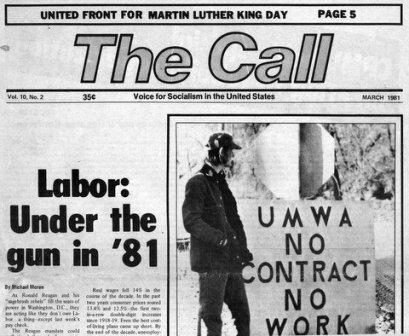
First Published: The Call, Vol. 10, No. 2, March 1981.
Transcription, Editing and Markup: Paul Saba
Copyright: This work is in the Public Domain under the Creative Commons Common Deed. You can freely copy, distribute and display this work; as well as make derivative and commercial works. Please credit the Encyclopedia of Anti-Revisionism On-Line as your source, include the url to this work, and note any of the transcribers, editors & proofreaders above.
Over a year ago the CPML Central Committee called on the members to sum up their work, with particular attention to ultra-left errors, in preparation for a Congress–a representative body of the membership which has the highest authority in the organization. This Congress has still not been held.
A serious situation developed in the Standing Committee, the national body charged with giving leadership on a day-to-day basis. On the one hand, strikingly different views existed on the origin and extent of these ultra-left errors. On the other hand, these differences were not opened up to the membership for a long time.
Unable to work together, the Standing Committee became incapable of organizing the debate and maintaining the organization. Exactly why this happened still needs to be summed up. Three members of that body have now left the CPML. The chairman resigned his position.
Meanwhile many members of the organization had been trying to fight leftism in practice and had already made significant changes in their work. They wanted to sum up where those errors came from–to what extent did they represent dogmatism in applying our guiding principles, and to what extent were they caused by the principles themselves? Where the latter was true, were we wrong in calling those principles Marxism-Leninism, or was Marxism-Leninism wrong on certain points? For example, many CPML members feel our mistakes of sectarianism flowed from our conception of ourselves as the vanguard party. But there is disagreement over whether the whole concept of vanguard party is invalid, or whether it was misapplied.
At the same time, organizationally things had begun to disintegrate in many ways. Some serious errors around national chauvinism and male chauvinism had taken their toll. Members wanted a commitment to look at all these questions openly and candidly. They wanted to know that sum-up and change would be based on their actual experiences.
All this was happening at a time when the right wing was on the warpath and Reagan galloped into office. Progressive forces who had not worked together for a long time were seeing the need to put aside differences and come together to defend people’s living standards and hard-won rights. Just when clarity and organizational cohesion were most important, the situation in the CPML was at its worst.
Because of this, some leading members took the initiative to call for an Emergency Delegates Conference, which took place at the end of January. This conference was a step toward rebuilding organization, an organization that serves its membership and reflects their experience.
The conference made clear that many differences exist in the organization. But the majority of delegates were united on several things:
*They want an open but organized debate on these questions. Most people reject the suggestion that the raising of questions or the existence of widely divergent views is the source of the present crisis.
*The debate has to be based on and focused around practical experience, not on abstract discussions. We have to resolve the bottom line principles that unite us and develop a mechanism for continuing debate on other questions.
*While there are many legitimate questions about how to build and structure a revolutionary organization in the U.S., we must maintain and transform organization, rather than dissolve into a loose network of activists.
*Key to our survival is a re-examination of our views and practice on the national question. Strong criticisms have been raised about national chauvinism within the organization and about views that downplayed the role of the national movements. The nationality commissions in the past were seen only as “advisory” (not policy-making) bodies.
In response to errors of chauvinism and ultra-leftism, many proposals have been made by minority members, including calls for forms of organizational autonomy. These are being given serious consideration.
*The conference discussion of several points underscored the problems women have faced in the organization. The fact that a number of women have left or become inactive, that the interim committee that was elected is only 30% women, and that a number of women felt they couldn’t run for that committee, makes this question all the more urgent. There was a significant call to criticize male chauvinism and carefully study the resolution on women soon to be distributed.
*Important mass work is going on all around the country. This work must continue and help inform the internal struggle, rather than be shunted aside because of it.
Decisions of the conference included election of an interim political committee (IPC) to organize the debate and other preparations for the Congress. This body will replace the former Central Committee.
Our Congress itself will not signify the culmination of the rectification process. But it does mean a significant attempt to reorganize ourselves, making whatever improvements we must to help unite Marxist-Leninists, organizing and recruiting more workers, attracting as many individuals as possible who have left our ranks, integrating with and serving the struggles of national liberation and those for broad democracy, and developing skills at applying Marxism-Leninism to our situation and carrying out revolutionary education. In this way we can move along the path towards fulfilling our dreams which gave rise to our trend–dreams of ending the exploitation, discrimination and injustices engendered by monopoly capitalism.